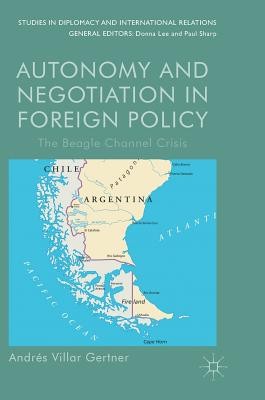
- Išsiųsime per 10–14 d.d.
- Autorius: Andrés Villar Gertner
- Leidėjas: Palgrave Macmillan
- ISBN-10: 1137572744
- ISBN-13: 9781137572745
- Formatas: 15.4 x 21.9 x 1.7 cm, kieti viršeliai
- Kalba: Anglų
- Extra -15 % nuolaida šiai knygai su kodu: ENG15
Autonomy and Negotiation in Foreign Policy + nemokamas atvežimas! | knygos.lt
Atsiliepimai
Aprašymas
This book provides a unique view on the Beagle Channel crisis (1977-1984) between Argentina and Chile by examining it in a global political context. The author explores the factors which led from imminent conflict to signing the Treaty of Peace and Friendship in just six years. Regional and international dimensions of the Beagle crisis are given particular attention, including international arbitration, the participation of the Vatican as a third actor, the role of the US, the complicating effects of the Falkland war, and the relations between each party and the UK. The author highlights unequal effects on Argentine and Chilean foreign policies of domestic structures and international conditions. The book seeks to determine the extent to which foreign policy provides opportunities for states to exercise political autonomy, given the powerful constraints imposed by the multiple structures of the international system, and how negotiation behaviour generated the path from conflict to cooperation between Argentina and Chile. The author's focus on foreign policy aids the understanding of processes and decisions within Argentina and Chile during the Beagle crisis while utilising new theoretical approaches in the field of negotiation behaviour in Latin America.
EXTRA 15 % nuolaida
Kupono kodas: ENG15
Akcija baigiasi už 3d.13:29:11
Nuolaidos kodas galioja perkant nuo 10 €. Nuolaidos nesumuojamos.

- Autorius: Andrés Villar Gertner
- Leidėjas: Palgrave Macmillan
- ISBN-10: 1137572744
- ISBN-13: 9781137572745
- Formatas: 15.4 x 21.9 x 1.7 cm, kieti viršeliai
- Kalba: Anglų
This book provides a unique view on the Beagle Channel crisis (1977-1984) between Argentina and Chile by examining it in a global political context. The author explores the factors which led from imminent conflict to signing the Treaty of Peace and Friendship in just six years. Regional and international dimensions of the Beagle crisis are given particular attention, including international arbitration, the participation of the Vatican as a third actor, the role of the US, the complicating effects of the Falkland war, and the relations between each party and the UK. The author highlights unequal effects on Argentine and Chilean foreign policies of domestic structures and international conditions. The book seeks to determine the extent to which foreign policy provides opportunities for states to exercise political autonomy, given the powerful constraints imposed by the multiple structures of the international system, and how negotiation behaviour generated the path from conflict to cooperation between Argentina and Chile. The author's focus on foreign policy aids the understanding of processes and decisions within Argentina and Chile during the Beagle crisis while utilising new theoretical approaches in the field of negotiation behaviour in Latin America.




Atsiliepimai